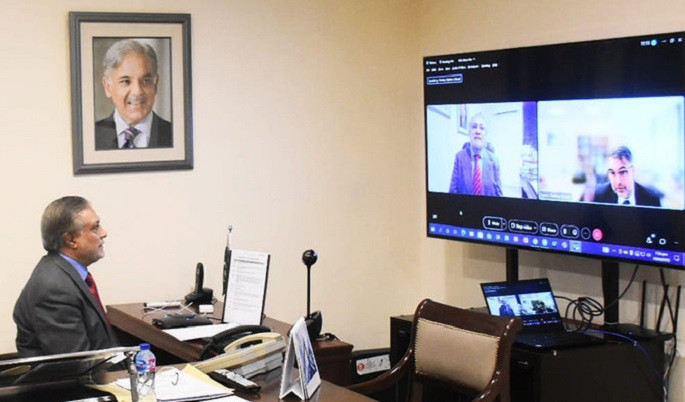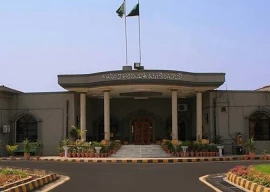
Pakistan emphatically requested the International Monetary Fund (IMF) on Wednesday to show some flexibility and sign the staff-level agreement, however, it could not get a date despite Islamabad’s growing concerns about the fallout of a worsening economic crisis.
The request was made by Finance Minister Ishaq Dar in a virtual meeting with Jihad Azour, the IMF’s director for the Middle East and Central Asia Department. However, the minister could not get the desired result, as the IMF once again raised the issue of petrol subsidy and possible fiscal leakages as a result of the implementation of the subsidy plan.
The two sides discussed the progress made on the IMF programme, particularly the talks held with the IMF mission during its visit to Pakistan, and the implementation of prior actions, according to the press statement issued by the finance ministry.
“The minister urges the IMF not to raise the issue of petrol subsidy, and object to the IMF’s approach of seeking clarifications about the schemes announced by Prime Minister Shehbaz Sharif,” said sources.
Dar also requested the IMF to lower the needed foreign loan requirement by another $1 billion to $5 billion after improvement in the current account deficit, the sources added. The IMF has already cut the requirement by $1 billion to $6 billion last month.
According to the sources, Dar assured the IMF that the government might not implement the petrol subsidy scheme and, therefore, the fund should no more raise the issue. The minister emphasised that the IMF should show flexibility and consider the progress that Pakistan had made so far in its endeavours for reaching the staff-level agreement early.
Due to a delay in finalising the agreement for the 9th review, the IMF has withheld the approval of the $1.1 billion tranche. Besides it also has delayed the disbursements by the World Bank and other multilateral institutions.
Dar “informed that all prior actions for 9th review under the Extended Fund Facility have already been completed and government of Pakistan is fully committed to fulfil its obligations as agreed with the IMF”, according to the ministry’s press statement.
According to the sources, Dar mentioned that it was unprecedented that the prior actions had been met much before the signing the staff-level agreement and yet the IMF was not ready to sign the deal.
However, the IMF was of the view that all the issues remained unsettled until the deal was ratified by its executive board, irrespective of the fact whether a country met the prior actions before the staff-level agreement or after that.
The sources said that the finance minister asked the IMF to come clear on the timeframe of the staff-level agreement as the delay was now causing economic losses to the country amid growing nervousness in the markets.
Finance Minister Ishaq Dar urged Nathan Porter, the IMF’s Mission Chief to Pakistan, who was also present in the meeting, to give the reasons for the delay in signing the deal, said the sources.
Pakistan has so far implemented a mini-budget, increased electricity and gas prices and allowed the exchange rate to be determined by the market forces – the prior actions that still could not get it the desired results.
“Ishaq Dar apprised IMF team about the economic challenges being faced by the country,” according to the finance ministry. The ministry claimed “Jihad Azour expressed his confidence that Staff-Level Agreement (SLA) will be signed soon followed by the IMF Board’s approval”.
Jihad hoped that Pakistan would continue toward progress on the reforms in various sectors and complete the IMF programme in time and that the IMF would play its positive role in bringing economic stability to Pakistan, the ministry said.
External Financing problem
Both sides shared their respective positions on the $6 billion external financing requirements -- a sum that Pakistan needed from now till June to avoid default.
The IMF informed that Saudi Arabia had given confirmation about the $2 billion lending to Pakistan. But confirmation by the United Arab Emirates remained pending, said the sources. Dar assured that the UAE would soon confirm its commitment to give $1 billion.
The sources said that Dar urged the IMF to further cut the external financing requirement to $5 billion due to improvement in the current account deficit. The $6 billion financing gap had been worked out on the assumption that the current account deficit would remain around $7 billion in the current fiscal year.
During the first eight months of this fiscal year, the current account deficit remained at $3.9 billion. Dar assured the IMF that in case the Fund signed the staff-level agreement, Pakistan would arrange the $2 billion additional loan from the World Bank, the Asian Infrastructure Investment Bank and the commercial banks.
But the IMF was asking for arranging commercial loans before the staff-level agreement -- a demand that Pakistan is unable to meet in absence of the IMF umbrella.


1725612926-0/Tribune-Pic-(8)1725612926-0-165x106.webp)








1725254039-0/Untitled-design-(24)1725254039-0-270x192.webp)






COMMENTS (7)
Comments are moderated and generally will be posted if they are on-topic and not abusive.
For more information, please see our Comments FAQ